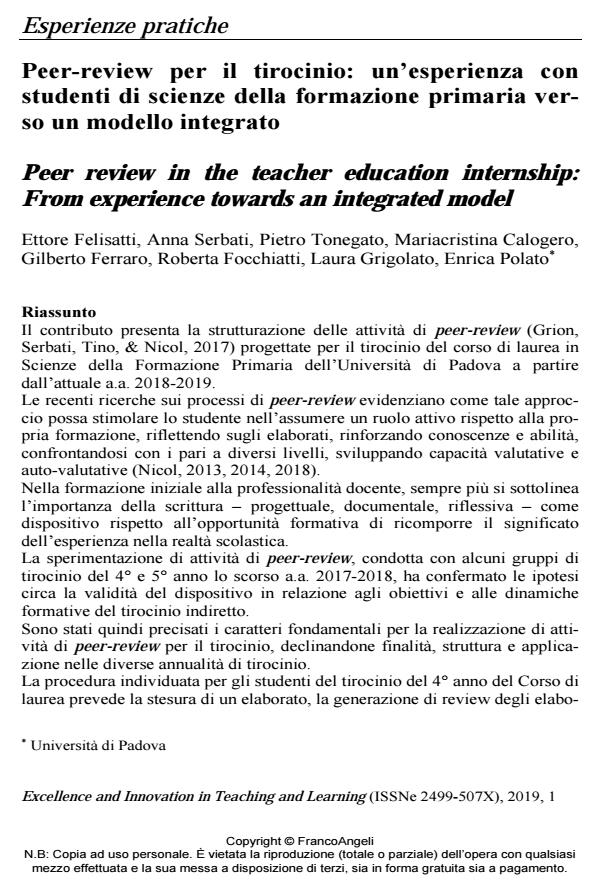Peer review in the teacher education internship: From experience towards an integrated model
Journal title EXCELLENCE AND INNOVATION IN LEARNING AND TEACHING
Author/s Ettore Felisatti, Anna Serbati, Pietro Tonegato, Mariacristina Calogero, Gilberto Ferraro, Roberta Focchiatti, Laura Grigolato, Enrica Polato
Publishing Year 2019 Issue 2019/1
Language Italian Pages 11 P. 92-102 File size 395 KB
DOI 10.3280/EXI2019-001006
DOI is like a bar code for intellectual property: to have more infomation
click here
Below, you can see the article first page
If you want to buy this article in PDF format, you can do it, following the instructions to buy download credits

FrancoAngeli is member of Publishers International Linking Association, Inc (PILA), a not-for-profit association which run the CrossRef service enabling links to and from online scholarly content.
The paper presents the structure of the peer-review activities (Grion, Ser-bati, Tino, & Nicol, 2017) planned during the internship for Pre-service Teacher Education students at the University of Padova. These activities refer to the current a.a. 2018-2019 and will continue in the next academic years, too. Recent research on peer-review shows how this approach fosters students to take an active role in their learning, reflecting on their own assign-ments, reinforcing knowledge and skills, learning by sharing and compar-ing perspectives with peers at different levels, developing assessment and self-assessment skills (Nicol, 2013, 2014, 2018). In the initial development of the teacher’s professionality, the importance of writing - interpreted as an exercise for planning, documenting, reflect-ing - is emphasised, because it represents an opportunity for students to understand and elaborate a personal meaning related to the experience that they live in the school context. In a.a. 2017-2018 a first pilot project with 6 groups of students during their 4th and 5th-year was carried out, asking students to peer review in-ternship projects mutually. This experience confirmed the importance of reflective writing about the main aims of the internship. Fundamental elements to carry out peer-review activities for the intern-ship were then specified, defining purposes, structure and implementa-tion during the internship years. The procedure identified for 4th-year students includes: drafting an as-signment concerning the internship experience, reviewing peers’ work including one high-quality assignment exemplar, writing inner feedback after reviewing, participating to a final collective reflection, in order to update the personal assignment towards the final drafting and submis-sion.
Keywords: Peer-review, peer feedback, internship, assessment, self-assessment
- Bell, A., Mladenovic, R., & Price M. (2013). Students’ perceptions of the usefulness of marking guides, grade descriptors and annotated exemplars. Assessment & Evaluation in Higher Education, 38(7), 769-788. DOI: 10.1080/02602938.2012.714738
- Calogero, M., Ferraro, G., & Tonegato, P. (2018). Università e Scuola: temi e contesti del tirocinio per crescere insieme nella formazione e nella professione. In I. Bolognesi, & M. D’Ascenzo, (a cura di), Insegnanti si diventa. L'esperienza di Tirocinio nei corsi di laurea magistrale in Scienze della Formazione Primaria. Milano: FrancoAngeli.
- Cho, Y.H., & Cho, K. (2011). Peer reviewers learn from giving comments. Instructional Science, 39(5), 629-643.
- Frigerio, A. (2004). La valutazione del tirocinio didattico. In E. Nigris, (a cura di), La formazione degli insegnanti. Percorsi, strumenti, valutazione. Roma: Carocci.
- Grion, V., & Serbati, A. (2017). (Edizione italiana a cura di), Assessment for Learning in Higher Education. Nuove prospettive e pratiche di valutazione all’università. Lecce: Pensa MultiMedia.
- Grion, V., Serbati, A., Tino, C., & Nicol, D. (2017). Ripensare la teoria della valutazione e dell’apprendimento all’università: un modello per implementare pratiche di peer review. Italian Journal of Educational Research, 19, 209-226. -- Tratto da http://ojs.pensamultimedia.it/index.php/sird/article/view/2554/2282.
- Grion, V., & Tino, C. (2018). Verso una “valutazione sostenibile” all’università: percezioni di efficacia dei processi di dare e ricevere feedback fra pari. Lifelong Lifewide Learning, 31, pp. 38-55.
- Laneve, C. (2009). Scrittura e pratica educativa. Un contributo al sapere dell’insegnamento. Trento: Erickson.
- Magnoler, P. (2008). L’insegnante professionista. Dispositivi per la formazione. Macerata: EUM.
- Mortari, L. (2003). Apprendere dall’esperienza. Il pensare riflessivo nella formazione. Roma: Carocci.
- Nicol, D. (2010). From monologue to dialogue: improving written feedback processes in mass higher education. Assessment & Evaluation in Higher Education, 35(5), 501-517. DOI: 10.1080/02602931003786559
- Nicol, D (2011). Developing students’ ability to construct feedback. QAA Scotland: Enhancement Themes. -- Tratto da http://www.enhancementthemes.ac.uk/resources/publications/graduates-for-the-21st-century.
- Nicol, D. (2013). Resituating feedback from the reactive to the proactive. In D. Boud, & E. Molloy (Eds). Feedback in Higher and Professional Education: Understanding it and doing it well, pp. 34-49. Oxon: Routledge.
- Nicol, D. (2014). Guiding Principles for Peer Review: Unlocking Learners’ Evaluative Skills. In C. Kreber, C. Anderson, N. Entwhistle, & J. McArthur, Advances and Innovations in University Assessment and Feedback (pp. 197-224), Edinburgh: Edinburgh University Press.
- Nicol, D. (2018). Unlocking generative feedback through peer reviewing. In V. Grion, & A. Serbati, (a cura di), Valutare l’apprendimento o valutare per l’apprendimento? Verso una cultura della valutazione sostenibile all’Università (pp. 47-59), Lecce: Pensa Multimedia.
- Perla, L. (2012). Scrittura e tirocinio universitario. Una ricerca sulla documentazione. Milano: FrancoAngeli.
Ettore Felisatti, Anna Serbati, Pietro Tonegato, Mariacristina Calogero, Gilberto Ferraro, Roberta Focchiatti, Laura Grigolato, Enrica Polato, Peer-review per il tirocinio: un’esperienza con studenti di scienze della formazione primaria verso un modello integrato in "EXCELLENCE AND INNOVATION IN LEARNING AND TEACHING" 1/2019, pp 92-102, DOI: 10.3280/EXI2019-001006